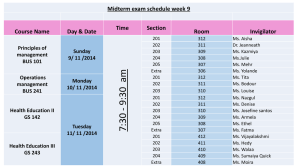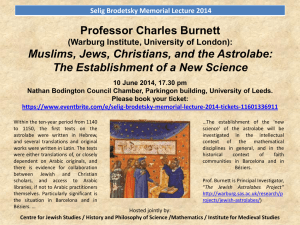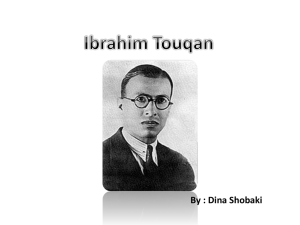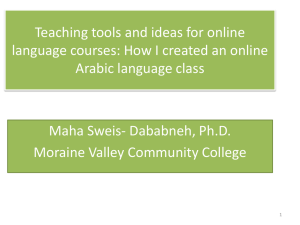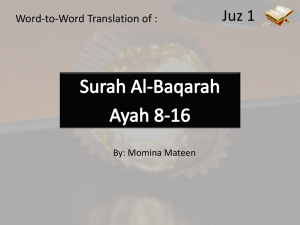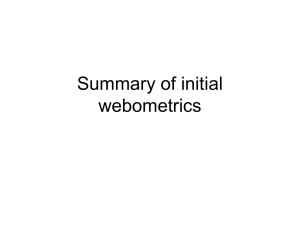EDEXCEL GCSE ARABIC
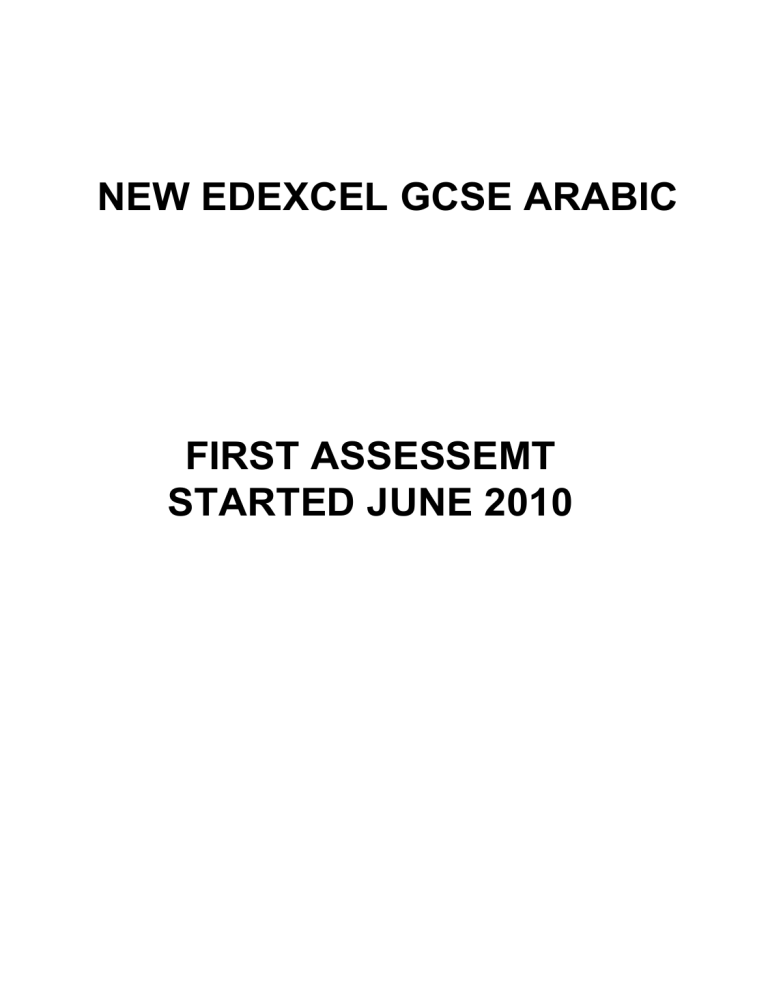
NEW EDEXCEL GCSE ARABIC
FIRST ASSESSEMT
STARTED JUNE 2010
KEY AIMS
To enable students to develop:
• an understanding of Arabic in a variety of contexts
• knowledge of Arabic vocabulary and structures
• transferable language skills
• the ability to communicate effectively in
Arabic
• awareness and understanding of countries, cultures and communities where Arabic is spoken.
THE NEW GCSE SPECIFICATIONS
• The Edexcel GCSE in Arabic consists of four units based on the four skills of Listening,
Speaking, Reading and Writing.
• The Edexcel GCSE Short Course in Spoken
Arabic is formed of these units: Speaking and
Listening.
• The Edexcel GCSE Short Course in Written
Arabic is formed of these two units: Reading and Writing.
• It is possible to amalgamate the results from the two Short Courses to form one complete
GCSE qualification.
• The full GCSE qualification is available for first certification in 2011 .
WHAT’S NEW IN THE ‘NEW’ GCSE
SPECIFICATION?
• Responding to the revised QCA subject criteria that centres must have a choice of contexts and purposes for speaking and writing.
• Allowing learners to personalise their learning and engage in activities which correspond to their interests.
• Giving flexibility and choice to both teaches and students.
• Providing progression opportunities to further study and / or employment.
• Clarity of structure, making it easier to plan teaching and integrate assessment.
• Coverage of all four language learning skills listening, speaking, reading and writing in a logical and straightforward progression.
KNOWLEDGE AND UNDERSTANDING
• Students develop their knowledge of vocabulary and structures in a range of settings which:
- are relevant and of interest to the student
correspond to the student’s level of maturity
- reflect, and are appropriate to, the culture of countries and communities where the language is spoken
- relate, where appropriate to other areas of the curriculum.
SKILLS
• This qualification requires students to:
• develop the ability to listen and understand spoken Arabic in a range of contexts and a variety of styles
• communicate in speech for a variety of purposes
• read and respond to different types of written language
• communicate in writing for a variety of purposes
• understand and apply a range of vocabulary and structures
• develop language learning and communication skills which can be applied broadly.
COMMON TOPIC AREAS
Students are expected to become familiar with the following generic topics, as well as ‘a minimum core vocabulary list’ (which cab found in the
Specifications booklet and the Edexcel
Website).
• Out and about
• Customer service and transaction
• Personal information
• Future plans, education and work
These topic areas, together with the minimum core vocabulary list, have been produced to aid teachers in planning and preparing students for success in the Listening and Speaking
Units.
CHOICE OF THEMES
• For Speaking and Writing Units, content will relate to the following broad themes.
1. Media, Travel and Culture
2. Sport, Leisure and Work.
• However, as the qualification provides flexibility, choice and, in the Speaking unit, scope for personalised learning, students are free to focus on any one of the above.
• Students can follow a vocationally focused pathway through the choice of theme in the
Speaking Unit.
• Students should be familiar with all of the above themes for the Writing unit.
LISTENING AND UNDERSTANDING IN
ARABIC UNIT 5AR01
• Students should be familiar with a range of vocabulary relevant to all the common topic areas.
• Students should be accustomed to hearing
Arabic language in a range of styles or different registers and in a variety of contexts, as appropriate to their age and level of understanding.
• Material used will feature both male and female voices and represent different age groups.
• Featured scenarios and situations are generally set in an Arabic speaking country or community and students are expected to develop appropriate cultural awareness and understanding.
ASSESSMENT OF LISTENING AND
UNDERSTANDING
• Students listen to and understand pre-recorded spoken language.
(45 minutes plus 5 minutes reading time).
• Each passage of Arabic is recorded twice, with pauses following the second hearing to allow each student sufficient time to write or note their response to each question, or part of question, and to read the next question before the related extract is played.
• The examination paper features questions that are asked in English requiring non-verbal
Reponses. A number of question types are used for this, including multiple choice and matching exercises.
• A mixture of visual and short verbal cues in
English may be provided,
SPEAKING IN ARABIC
5AR02
• Teachers are encouraged to engage students in a variety of speaking activities as they develop their language skills.
• These may range from participating in a simple 1:1 conversation to a more complex group discussion or podcast production.
• There is a wide selection of subtopics of the main theme which are available to teachers to choose from.
• Students are expected to develop an appropriate awareness and understanding of the culture and society of Arabic speaking countries and communities as part of their
Arabic language study.
ASSESSMET OF SPEAKING IN ARABIC
• Students choose to talk about one or both of the following themes:
• Media , travel and culture
• Sport, leisure and work.
• These are broad themes and offer students scope to engage in activities that coincide with their interests, experiences and aspirations.
• The assessment scenarios should provide opportunities for them to demonstrate knowledge and understanding of Arabic language and grammar as well as to present, discuss, interact, respond to questions, express feelings and give opinions in Arabic.
• Importantly, students, in negotiation with their teacher, can choose to relate their speaking assessments to either of the themes above.
ASSESSMENT OVERVIEW OF
SPEAKING (1)
• Students must undertake two separate speaking tasks, which must include both of following task types:
• theme-based picture-based discussion
(or presentation) with follow up questions
• general conversation linked to a theme.
• Each task should last for approximately four to five minutes and must occur in a timetabled assessment window usually between March and May.
• These tasks give students choice of content and, therefore, enable them to take some ownership of their assessment. It is intended that students use the picture as a prompt to discussion and that it relates to something they have some interest or involvement in.
ASSESSMENT OVERVIEW OF SEAKING
(2)
• The general conversation enables students to demonstrate that they can present information and give opinions as well as interact effectively with another Arabic speaker.
• Here teachers must ensure that they provide adequate opportunities for students to perform at their optimal level.
• Students must be given an opportunity to respond to unpredictable language. It is, therefore, important that teachers do not prepare a specific list of questions with their students in advance.
• The tasks will attract a maximum of 50 marks (25 marks for each task) for content and response,
range of language and accuracy.
• Students are able to score the highest marks without perfect or native speaker level Arabic.
READING AND UNDERSTANDIG IN
ARABIC 5AR03
• To prepare students adequately for this unit, teachers should exploit a range of vocabulary relevant to all the common topic areas.
• Students should be presented with Arabic language in a range of styles or registers and in a variety of different contexts as appropriate to their age and level of understanding.
• Students will be presented with different fonts and formats, for example, short printed messages, advertisements and email messages.
• Material presented will usually relate to an
Arabic –speaking country or community and students will be expected to develop appropriate cultural awareness and understanding.
ASSESSMENT OVERVIEW OF READING
• The examination paper features questions in
English requiring non-verbal responses such as multiple choice and matching exercises.
• A mixture of visual and short verbal cues in
English are provided.
• In addition, the paper awards marks for students’ short written English-language responses to certain questions.
• Questions appear in a mixed order rather than in order of increasing difficulty.
• Some questions may involve non verbal Arabic language responses.
• The paper carries a total of 50 marks.
• The question titles and rubrics will be in English throughout the paper.
WRITING IN ARABIC
5AR04
• To prepare students adequately for this unit, teachers should present and exploit a range of vocabulary relevant to all of the common topic areas.
• Students need to demonstrate that they can apply their knowledge and understanding of
Arabic language and grammar to write effectively in Arabic for different purposes and in different contexts.
• The examination paper requires students to undertake both a short task (for example, simple email message) and a more extended
Arabic writing task in which students can inform, describe, provide detail, express feelings and give opinions.
ASSESSEMTN OVERVIEW OF WRITNG
(1)
• The writing unit is externally assessed through an examination paper that consists of three tasks.
• The papers reward students for effective communication , knowledge and application of language, as well as accuracy.
• Tasks will be set in English to ensure that the assessment is not over-reliant on reading ability.
• Tasks provide opportunities for stretch and challenge through extended writing.
Students must be given access to an appropriate bilingual dictionary.
ASSESSEMTN OVERVIEW OF WRITNG
(2)
• Task 1: Students are required to produce a short writing task in Arabic (30-70 words) in response to a choice of four questions that relate to both of the prescribed themes. The task is assessed for communication and knowledge and application of language only.
• Task 2: Students will be expected to produce some extended writing in Arabic (at least 120 words). The task is assessed for communication, knowledge and application and accuracy of language.
• Tasks offer opportunities for students to narrate, express opinions and to justify points of view.
FINAL WORDS
• The new GCSE Course in Arabic is designed for use in schools and colleges.
• Choice of focus in the speaking unit.
• 100% externally marked.
• Outcome-based, single tier of assessment.
• Emphasis on active use and manipulation of language.
• Builds on best practice from previous Edexcel
GCSE specification.
• Short Courses in two skills: listening and speaking or reading and writing.
• Provides groundwork for GCE, AS and Advanced studies.
• The qualification may also add to an individual’s employability profile.

